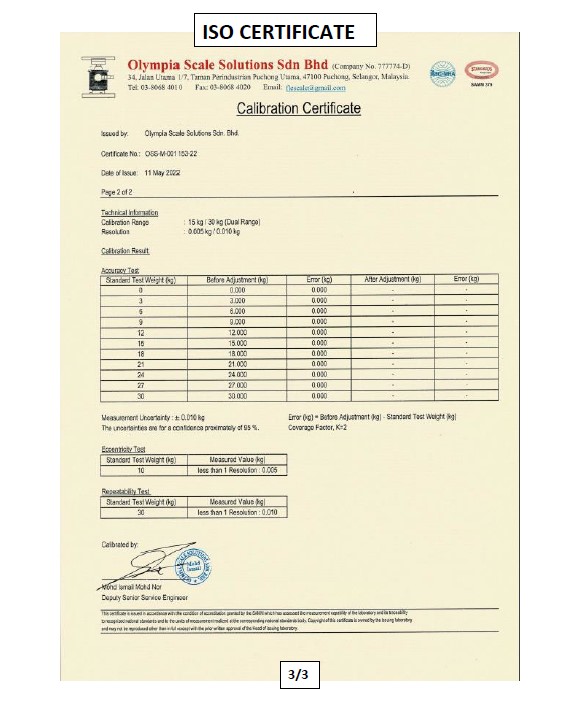1. Using verified and type-approved weighing scales
Legal requirement: under the Weights and Measures Act 1972 (Act 71)
- Responsibility user: only use type-approved weighing scales approved by Metrology Corporation Malaysia Sdn. Bhd. (MCM)
- The scale must be verified before use for commercial transactions
2. Annual re-verification of weighing scales
Over time, weighing scales may lose accuracy due to wear and tear. Annual re-verification ensures continued compliance.
- Schedule re-verification with MCM OR liase with licensed service provider for arrange re-verification matter
- Ensure the scale is recalibrated and resealed each year.
- Keep a copy of the verification certificate for audit and inspection purposes.
Using an unverified scale for trade can result in fines, confiscation, or legal action by the Ministry of Domestic Trade and Cost of Living (KPDN).
(refer sample Metrology Certificate License Sticker & Form D below)
.png)
3. Proper use and maintenance of scales
Best Practices for Compliance:
- Avoid overloading or misusing the weighing scale.
- Place the scale on a level surface.
- Do not tamper with the verification seal or calibration setting.
- Ensure only trained staff operate the scale.
- Pro Tip: Schedule regular internal checks using standard test weights.
4. Calibration Certificate (For Internal Quality Assurance)
While not mandatory by law, a calibration certificate (from a SAMM-accredited lab) adds credibility and accuracy assurance, especially for industries like manufacturing and pharmaceuticals OR at least a calibration report from licensed repairer
Recommended Frequency: Annually
(refer sample ISO accreditation calibration certificate)

5. Inspection Readiness
Who may Inspect:
- Enforcement officers from KPDN
- Authorized officers from MCM
- Valid verification certificate and sticker
- Scale accuracy
- Seals and any sign of tampering
- Business registration and dealer/repairer information
6. Record Keeping
Must Keep:
- Type Approval documents (if purchased directly)
- Annual verification certificates
- Calibration certificates (if applicable)
- Purchase invoices for traceability
- Duration: At least 3–5 years for audit or compliance review.
Penalties for Non-Compliance:
- Fines up to RM 25,000 for individuals
- Fines up to RM 50,000 for companies
- Seizure of weighing equipment
- Suspension of business licenses
Conclusions:
For weighing scale users in Malaysia, compliance isn't just about following the law — it's also about ensuring trust and transparency in your business operations. By keeping your equipment verified, properly calibrated, and legally documented, you help uphold the integrity of Malaysia’s trade system.
Contact us today to schedule a free site visit or consultation:
www.weighingscale.com.my
Selangor Johor











 BR 7013
BR 7013  US 5375
US 5375  IN 2784
IN 2784  MY 2521
MY 2521  SG 1713
SG 1713  VN 1471
VN 1471  CN 1402
CN 1402  AR 1257
AR 1257 



